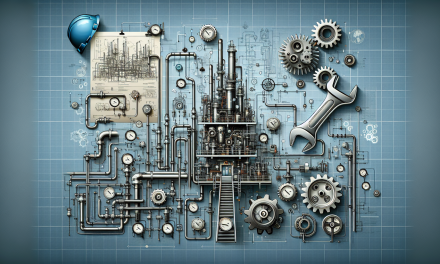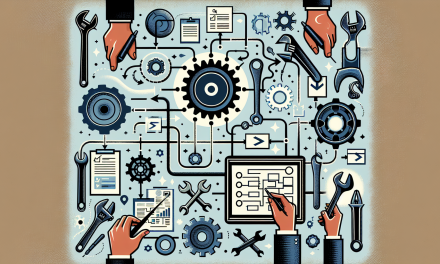Table of Contents
- Introduction
- Importance of Effective Maintenance Management
- Challenges in Maintenance Management
- Key Strategies for Effective Maintenance Management
- Essential Skills for Maintenance Management
- Enhancing Maintenance Skills
- FAQs
- Conclusion
Introduction
Welcome to the world of maintenance management, where effective practices can significantly boost operational efficiency and productivity. Every organization faces unique challenges when it comes to maintaining assets, machinery, and infrastructure. However, by adopting a proactive approach, it is possible to develop a robust framework that not only addresses these challenges but also enhances overall performance. In this article, we will delve into the essentials of maintenance management, explore the importance of effective training, and discover strategies to create a more efficient maintenance culture.
Importance of Effective Maintenance Management
Effective maintenance management does more than just keep equipment running; it aligns with the organization’s strategic goals. To elaborate, consider the benefits:
- Minimized Downtime: Reduced maintenance-related interruptions allow companies to enhance productivity.
- Cost Efficiency: Regular and systematic maintenance management can lead to significant savings by preventing major breakdowns.
- Increased Equipment Lifespan: Proper maintenance extends the life of assets, ensuring better returns on investment.
- Improved Safety: Regular inspections and proper management mitigate risks, resulting in a safer work environment.
Challenges in Maintenance Management
Despite the advantages, maintenance management faces numerous challenges that can hinder performance. Recognizing these challenges is the first step toward addressing them effectively:
1. Workforce Management
Maintaining a skilled and motivated workforce can be challenging. Employee turnover and lack of training contribute to inefficiencies.
2. Resource Allocation
Allocating resources effectively for maintenance tasks often becomes a struggle. Limited budgets and time constraints exacerbate this issue.
3. Technology Integration
Adopting new technologies can be daunting, particularly for organizations not familiar with advanced maintenance solutions.
Key Strategies for Effective Maintenance Management
Implementing effective maintenance strategies can significantly impact the performance of an organization. Here are some key strategies to consider:
1. Develop a Comprehensive Maintenance Plan
A well-thought-out maintenance plan that includes scheduled preventive maintenance, inspections, and emergency response can streamline processes.
2. Foster a Maintenance Culture
Creating a maintenance-oriented workplace culture ensures everyone understands their role in maintaining equipment and contributing to operational excellence.
3. Utilize Technology to Enhance Operations
Integrating maintenance management software and tools can optimize workflows, track assets, and streamline communication.
4. Learn from Data and Analytics
Utilizing data analytics enables organizations to make informed decisions based on historical performance, thus improving future maintenance strategies.
Essential Skills for Maintenance Management
To succeed in maintenance management, teams must possess a diverse skill set. Here are some crucial skills necessary for high-performing maintenance teams:
1. Technical Proficiency
Understanding the technical aspects of machinery and equipment is crucial for effective troubleshooting and maintenance work.
2. Leadership and Communication
Effective leaders inspire teams to adopt best practices and ensure that communication flows seamlessly across departments.
3. Problem-Solving Skills
Quick and efficient problem-solving capabilities are essential to address unexpected maintenance issues that may arise.
Enhancing Maintenance Skills
Improving the skills of maintenance personnel is an ongoing process. To enhance your team’s expertise, consider enrolling them in specialized training programs. For instance, Effective Maintenance Management Training Course offers valuable insights that can elevate your maintenance practices considerably.
Moreover, ensuring continuous training helps personnel keep up with industry advancements. Here are some additional resources that might interest you:
- Mastering the Art of Writing Effective Maintenance Procedures
- Elevate Your Skills with Maintenance Audit and Site Inspection Insights
- Unlocking Maintenance Reliability: Asset Management Technology Best Practices
- The Ultimate Guide to Creating Maintenance Excellence Training
- Mastering Troubleshooting in Process Operations
Frequently Asked Questions (FAQs)
1. What is maintenance management?
Maintenance management refers to the process of maintaining assets to ensure they operate efficiently and effectively, minimizing downtime and costs.
2. Why is training important in maintenance management?
Training is crucial because it equips personnel with the necessary skills and knowledge to perform maintenance activities effectively, ultimately leading to improved operational performance.
3. How do I assess my maintenance team’s skills?
Conducting performance evaluations, obtaining feedback from supervisors, and utilizing skills assessments can help identify areas for improvement within your maintenance team.
Conclusion
In conclusion, fostering effective maintenance management practices is vital for the overall success of any organization. By recognizing the importance of proactive maintenance strategies, addressing challenges, and providing ongoing skills training, you can create a strong maintenance culture that significantly benefits your organization’s operational efficiency. Embracing effective maintenance techniques, exploring various resources, and continuously striving for improvement will ensure a brighter and more efficient future for your maintenance management endeavors.





